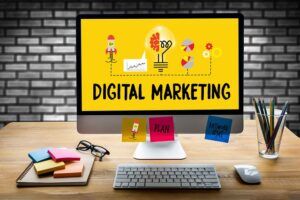If you’re looking to grow your business, reach a larger audience, and stay competitive in today’s digital landscape, digital marketing is your secret weapon. Reach out to broader audience through various digital marketing channels. In this comprehensive guide, we’ll cover everything you need to know about digital marketing—what it is, why it’s crucial for businesses, the different strategies involved, and how to create a successful digital marketing plan.
Whether you’re a small business owner, a marketer, or simply curious about the field, this blog post will equip you with actionable insights and strategies to excel in digital marketing. Let’s dive in!

Table of Contents
What is Digital Marketing?
Digital marketing refers to the use of digital channels, such as websites, social media, search engines, email, and other online platforms, to promote products or services. Unlike traditional marketing methods like print and TV ads, digital marketing allows businesses to connect with their audience in a more personalized and measurable way.
Example:
When you see a sponsored post on Instagram or an email promoting an online sale, you’re experiencing digital marketing in action.
Why Is Digital Marketing Important?
In today’s internet-driven world, digital marketing is an essential tool for businesses of all sizes. Here’s why:
- Global Reach: Through digital marketing, businesses can connect with customers from all over the world.
- Cost-Effective: Compared to traditional advertising, digital marketing is often more affordable and delivers a higher return on investment (ROI).
- Measurable Results: With tools like Google Analytics, businesses can track the performance of their campaigns in real time.
- Targeted Advertising: Digital marketing allows you to target specific demographics, ensuring your message reaches the right people.
- Engagement: Social media and other platforms enable businesses to engage with their audience and build relationships.
Example:
A small business using Facebook ads to target 25-35-year-old women interested in fitness can see exactly how many people clicked and purchased their product.

Key Components of Digital Marketing
Effective digital marketing involves a combination of strategies. Here are the key components:
a. Search Engine Optimization (SEO)
SEO is the process of optimizing your website to rank higher on search engines like Google. When done right, it helps your website appear at the top of search results for relevant keywords (like “digital marketing”).
- On-page SEO: Optimizing content, meta tags, and keywords.
- Off-page SEO: Building backlinks and improving domain authority.
- Technical SEO: Improving your website’s speed, mobile-friendliness, and structure.

b. Content Marketing
Content marketing focuses on creating valuable and relevant content to attract and engage your audience. Examples include blog posts, videos, podcasts, infographics, and eBooks.
Why It’s Important: High-quality content builds trust and positions your brand as an industry expert.
c. Social Media Marketing
This involves promoting your brand on platforms like Facebook, Instagram, LinkedIn, TikTok, and Twitter. Social media marketing is a powerful way to connect with your audience, build brand awareness, and drive traffic to your website.

d. Pay-Per-Click Advertising (PPC)
PPC is a paid advertising model where businesses pay a fee each time someone clicks on their ad. Google Ads is one of the most popular platforms for PPC campaigns.

e. Email Marketing
Email marketing involves sending targeted messages to your subscribers to nurture leads and convert them into customers. Examples include newsletters, promotional emails, and welcome sequences.

f. Affiliate Marketing
In affiliate marketing, businesses partner with affiliates (bloggers, influencers, or websites) who promote their products in exchange for a commission.
g. Influencer Marketing
Influencer marketing involves collaborating with influencers who have a significant following to promote your brand. This works especially well on platforms like Instagram and TikTok.
h. Mobile Marketing
Mobile marketing targets users on their smartphones through SMS campaigns, mobile apps, and mobile-friendly websites.
Benefits of Digital Marketing
Here are some of the key benefits of digital marketing:
- Cost-Effective: Ideal for businesses with limited budgets.
- Measurable Results: Track performance metrics like clicks, conversions, and ROI.
- High Engagement: Interact with your audience through comments, likes, and shares.
- Flexibility: Adjust campaigns in real time based on performance data.
- Personalization: Deliver tailored advertisements and content.

How to Create a Digital Marketing Strategy
A well-thought-out strategy is the foundation of any successful digital marketing campaign. Follow these steps:
- Define Your Goals: What do you want to achieve? Increased traffic? More sales?
- Know Your Audience: Use tools like Google Analytics and social media insights to understand your target audience.
- Choose Your Channels: Select the platforms that make the most sense for your business (e.g., Instagram for fashion brands, LinkedIn for B2B companies).
- Set a Budget: Decide how much you can invest in paid ads, tools, and resources.
- Create Content: Develop valuable content that resonates with your audience.
- Track and Optimize: Use analytics to monitor performance and make adjustments.
Key Trends in Digital Marketing (2025 and Beyond)
Stay ahead of the curve by embracing these trends:
- AI and Automation: Chatbots and automated email sequences.
- Voice Search Optimization: Content optimized for voice assistants like Alexa.
- Video Marketing: Short-form videos on platforms like TikTok and YouTube.
- Interactive Content: Polls, quizzes, and interactive infographics.
- Sustainability Marketing: Highlighting eco-friendly practices.

Common Mistakes to Avoid
- Ignoring mobile users.
- Overloading on keywords (keyword stuffing).
- Neglecting your audience’s needs.
- Failing to analyze results.
Tools and Resources for Digital Marketing Success
Here are some tools to help you succeed in digital marketing:
- SEO Tools: Ahrefs, SEMrush, Google Search Console.
- Social Media Management: Hootsuite, Buffer.
- Email Marketing: Mailchimp, Constant Contact.
- Analytics: Google Analytics, HubSpot.
Digital Marketer
A digital marketer is a professional responsible for creating, implementing, and managing marketing campaigns across various online channels such as social media, search engines, email, and websites. Their goal is to drive traffic, generate leads, and convert audiences into customers by leveraging data-driven strategies and tools.
Digital Marketing Skills
To succeed in this field, a digital marketer needs a diverse set of skills, including SEO, content creation, social media management, data analysis, email marketing, and paid advertising. Strong communication, creativity, and adaptability are also essential to stay ahead in the constantly evolving landscape of digital marketing.
Digital Marketing Certification
Obtaining a digital marketing certification is a great way to validate your expertise and boost your career prospects. Certifications from reputable platforms like Google, HubSpot, or Coursera can help you gain industry-recognized credentials and stay updated on the latest trends and tools.
Types of Digital Marketing
There are several types of digital marketing, including SEO, content marketing, social media marketing, email marketing, PPC advertising, affiliate marketing, and influencer marketing. Each type plays a unique role in reaching and engaging your target audience, making it crucial to use a mix of these strategies for a well-rounded approach.
Follow marketing efforts and digital strategies
You can show up you products and services to the target audiences through marketing efforts and by advising with marketing professionals to explain different search engine marketing, digital platforms, marketing techniques, online marketing, online advertising, marketing analytics, digital strategies, digital media usage, digital marketing courses, marketing institutes. you should also know marketing automation, digital technologies, difference between digital and traditional marketing, inbound marketing.
Conclusion
Digital marketing is no longer optional—it’s a necessity. By leveraging the strategies and tools outlined in this guide, you can connect with your target audience, grow your brand, and achieve your business goals. Whether you’re just starting out or looking to refine your approach, the key is to stay adaptable, focused, and informed.
Call to Action: Ready to take your business to the next level? Start implementing these digital marketing strategies today and watch your brand thrive!




Pingback: Best Techniques for E-commerce SEO in 2025: Boost Sales
18bxej